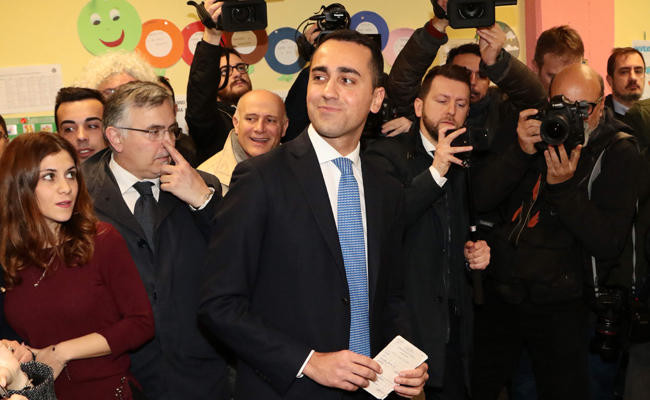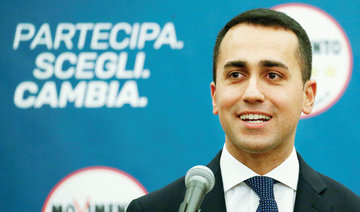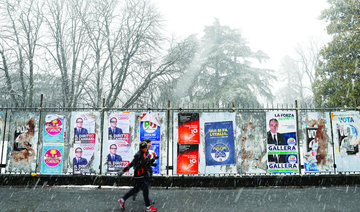ROME: Derided as an empty-headed puppet by his opponents, telegenic young gun Luigi Di Maio has engineered the Five Star Movement’s rise from populist insurgency to Italy’s biggest political party by far.
With boyish good looks and an easy-going manner, 31-year-old Di Maio symbolizes a strategic shift for the anti-establishment party from the frantic conspiratorial ranting of iconoclast founder and stand-up comedian Beppe Grillo to a new measured, reassuring style.
Di Maio has been criticized for his poor command of grammar but waged an exhausting campaign around the country, capturing new voters in economically disaffected regions of southern Italy.
The party looked set to win more than 30 percent of the national vote, according to preliminary results.
While this would be second place to the main right-wing coalition, the result would make it the largest single party in Parliament, followed by the ruling center-left Democratic Party at 20 percent.
The party has used its newly “mature” image to capture voters from the traditional parties that 69-year-old Grillo long railed against.
Instead of the expletive-filled rants of his shaggy-haired former boss, Di Maio offers calmer, considered political reflections.
“We do not want a populist, extremist or anti-European Italy,” Di Maio has said.
“He is very popular among the party faithful and his strength lies precisely in being completely different from Beppe Grillo, both in his communication style and in his appearance,” said Alberto Castelvecchi, a professor at Rome’s Luiss University.
But despite the apparent differences, Di Maio is very much a Grillo disciple.
He has been involved with M5S since its creation in 2009, campaigning against corruption and the EU while promoting political transparency and direct democracy.
Following the February 2013 election, M5S won a spectacular quarter of the vote and Di Maio, then aged just 26, was among 108 M5S candidates elected to the Chamber of Deputies — the lower house of the Italian Parliament.
A month later he became the chamber’s youngest ever deputy speaker.
His astonishing ascent did not go unnoticed and the nature of his elevation to rank of prime ministerial candidate also raised eyebrows.
Selected via an online vote, in which Di Maio’s competitors were relative unknowns, many commentators branded his election as a coronation organized by “puppet-master” Grillo.
“Is it the man who is being chosen or his readiness to take orders and advice?” asked newspaper La Stampa.
Others questioned his political authenticity, accusing him of being a hybrid creation of Grillo and consultants.
“Di Maio was created to be moderate, reassuring to mums,” according to Italian political journalist Jacopo Iacoboni.
Di Maio was born on July 6, 1986 into a well-to-do family in Avellino near Naples.
His father Antonio had a small construction business and was an activist for a now-defunct neo-fascist party Italian Social Movement, while his mother Paola was a Latin teacher.
The eldest of three children, Di Maio studied computer engineering at Naples University, later switched to law and never completed a degree.
According to a CV posted on M5S’s website, Di Maio founded his own web and social media marketing business while studying, as well as working on video projects.
That focus on marketing and presentation helps explain why M5S has managed to shift its to tone on key issues with Di Maio at the helm.
The party had consistently called for Italy to leave the eurozone, but Di Maio recently made more conciliatory noises about the idea of staying in the bloc.
His reaction was also noted following the murder of a teenage girl, blamed on a Nigerian, and a far-right revenge shooting that left six African migrants injured in the central town of Macerata last month.
Amid a public outcry, Di Maio stayed silent on the gun rampage and instead focused on former prime minister Silvio Berlusconi for creating the “ticking social time bomb of immigration.”
“On matters like ethics and immigration,” wrote Catholic weekly Famiglia Cristiana, Di Maio ideas are “like those of a surfer riding a wave.”
Di Maio: The reassuring face of Italian populism
Di Maio: The reassuring face of Italian populism

Australia’s Prime Minister Anthony Albanese wins a second three-year term

The Australian Electoral Commission’s projections gave Albanese’s ruling center-left Labour Party 70 seats
MELBOURNE: Prime Minister Anthony Albanese has become the first Australian prime minister to win a second consecutive three-year term in 21 years.
Opposition leader Peter Dutton conceded defeat in Saturday’s election, saying, “We didn’t do well enough during this campaign, that much is obvious tonight, and I accept full responsibility for that.”
“Earlier on, I called the prime minister to congratulate him on his success tonight. It’s a historic occasion for the Labour Party and we recognize that,” he added.
The Australian Electoral Commission’s projections gave Albanese’s ruling center-left Labour Party 70 seats and the conservative opposition coalition 24 seats in the 150-seat House of Representatives, the lower chamber where parties need a majority to form governments. Unaligned minor parties and independent candidates appeared likely to win 13 seats.
Australian Broadcasting Corp. respected election analyst Antony Green predicted Labor would win 76 seats, the coalition 36 and unaligned lawmakers 13. Green said Labor would form a majority or minority government and that the coalition had no hope of forming even a minority government.
Energy policy and inflation have been major issues in the campaign, with both sides agreeing the country faces a cost of living crisis.
Opposition leader branded ‘DOGE-y Dutton’
Dutton’s conservative Liberal Party blames government waste for fueling inflation and increasing interest rates, and has pledged to ax more than one in five public service jobs to reduce government spending.
While both say the country should reach net-zero greenhouse gas emissions by 2050, Dutton argues that relying on more nuclear power instead of renewable energy sources such as solar and wind turbines would deliver less expensive electricity.
The ruling center-left Labour Party has branded the opposition leader “DOGE-y Dutton” and accused his party of mimicking US President Donald Trump and his Department of Government Efficiency.
Labor argues Dutton’s administration would slash services to pay for its nuclear ambitions.
“We’ve seen the attempt to run American-style politics here of division and pitting Australians against each other and I think that’s not the Australian way,” Albanese said.
Albanese also noted that his government had improved relations with China, which removed a series of official and unofficial trade barriers that had cost Australian exporters 20 billion Australian dollars ($13 billion) a year since Labor came to power in 2022.
A cost of living crisis as the country faces generational change
The election is taking place against a backdrop of what both sides of politics describe as a cost of living crisis.
Foodbank Australia, the nation’s largest food relief charity, reported 3.4 million households in the country of 27 million people experienced food insecurity last year.
That meant Australians were skipping meals, eating less or worrying about running out of food before they could afford to buy more.
The central bank reduced its benchmark cash interest rate by a quarter percentage point in February to 4.1 percent in an indication that the worst of the financial hardship had passed. The rate is widely expected to be cut again at the bank’s next board meeting on May 20, this time to encourage investment amid the international economic uncertainty generated by Trump’s tariff policies.
Both campaigns have focused on Australia’s changing demographics. The election is the first in Australia in which Baby Boomers, born between born between the end of World War II and 1964, are outnumbered by younger voters.
Both campaigns promised policies to help first-home buyers buy into a property market that is too expensive for many.
The election could produce a minority government
Going into the election, Labor held a narrow majority of 78 seats in a 151-seat House of Representatives. There will be 150 seats in the next parliament due to redistributions.
A loss of more than two seats could force Labor to attempt to form a minority government with the support of unaligned lawmakers.
There was a minority government after the 2010 election, and the last one before that was during World War II.
The last time neither party won a majority, it took 17 days after the polls closed before key independent lawmakers announced they would support a Labor administration.
‘Unremitting violence’ against Myanmar civilians must end, says UN rights chief

- More than 200 civilians were killed in airstrikes last month after March’s devastating earthquake killed at least 3,800
- Warring factions in civil war launched ‘relentless attacks’ despite month-long ceasefire
NEW YORK CITY: Civilians in war-torn Myanmar are facing “unremitting violence” despite a month-long ceasefire that was reached in the wake of March’s devastating earthquake, the UN’s human rights chief has said.
It comes after the country’s military regime launched at least 243 attacks since the March 28 earthquake.
More than 200 civilians were reportedly killed in the strikes.
“Amid so many crises around the world, the unbearable suffering of the people in Myanmar cannot be forgotten,” Volker Turk said on Friday.
“The vast majority of attacks happened after April 2 when the Myanmar military and the National Unity Government announced unilateral ceasefires,” he added.
The earthquake in March killed more than 3,800 people and decimated infrastructure across the country.
More than 55,000 homes were damaged and destroyed across several regions of Myanmar.
The disaster compounded an already dire humanitarian situation in the Southeast Asian country, with more than one-third of the population of almost 20 million people requiring assistance even before the earthquake.
The country’s military regime and the opposition National Unity Government announced a temporary ceasefire after the disaster.
It was extended in mid-April and expired on April 30.
Civil society sources recorded repeat violations of the ceasefire by the military, including numerous attacks on civilian rescuers shortly after the earthquake.
Myanmar’s civil war, which began in 2021, has killed almost 80,000 people.
“Families already displaced by years of conflict now face early torrential rains, extreme heat and rising risk of disease” in the wake of the earthquake, the UN said.
According to a World Health Organization report published on Friday, more than 450,000 people in Myanmar require critical health services, but only about 33,600 have been reached.
Turk warned that the “relentless attacks” carried out by warring parties in the country are “affecting a population already heavily beleaguered and exhausted by years of conflict.”
The fighting is also disrupting efforts to deliver essential aid to people across Myanmar, he added.
“International law is clear that humanitarian aid must be able to reach those in need without impediment,” Turk said.
“This is the time to put people first, to prioritize their human rights and humanitarian needs, and to achieve a peaceful resolution to this crisis.”
UN officials in Myanmar have also sounded the alarm on the deteriorating situation in the country.
Marcoluigi Corsi, humanitarian and resident coordinator ad interim for Myanmar, spoke to the press in New York City via video link from Yangon on Thursday.
One month on from the earthquake, “the suffering is immense and the stakes are very high,” he said.
Corsi called on the international community to urgently deliver their pledged aid amounts, and that “without timely action, the crisis would get worse.”
Early last month, the UN and its humanitarian partners launched a $275 million appeal as an addition to a major humanitarian strategy to reach about 1.1 million people in need across Myanmar.
Yet the appeal has only received $34 million in pledges, Corsi said, adding: “Lives depend on our collective commitment to delivering the support that is desperately needed … the time to act is now.”
Russia accuses Zelensky of making ‘direct threat’ to May 9 events

- “He is threatening the physical safety of veterans,” Zakharova said
MOSCOW: Russia on Saturday accused Volodymyr Zelensky of threatening the security of its World War II commemorations on May 9, after the Ukrainian president said Kyiv would not “take responsibility” for ensuring safety on the day.
“He is threatening the physical safety of veterans who will come to parades and celebrations on the holy day,” Russian foreign ministry spokeswoman Maria Zakharova said on Telegram. “His statement ... is, of course, a direct threat.”
Terminally ill Syrian woman permitted to enter UK after govt U-turn

- Soaad Al-Shawa has been given weeks to live by doctors
- She was initially denied request to see her daughter and son-in-law who fled Syria in 2015
LONDON: A Syrian woman dying of cancer will travel to the UK to see her grandchildren, whom she has never met, after a UK Home Office decision.
Soaad Al-Shawa, who has liver cancer and has been given just weeks to live by doctors, was initially denied a family-reunion request by the UK government, The Guardian reported.
She had asked to travel to Britain to meet up with her daughter Ola Al-Hamwi, son-in-law Mostafa Amonajid, and their three children, aged seven, five and one.
The family fled Syria in 2015 — unable to take Al-Shawa with them — and now reside in Glasgow. Since then. Al-Shawa has only communicated with her grandchildren via video calls.
She received a terminal cancer diagnosis late last year, and her daughter applied for a refugee family reunion in the UK, which was rejected. The family appealed and, in April, an immigration judge agreed to overturn the decision.
However, the UK Home Office later sought permission to appeal the judge’s ruling, in a move that may have taken at least eight months.
Al-Shawa may not have that long to live, with her daughter saying at the time that the decision was “breaking her heart.” Now, the Home Office has told the family’s lawyer it is withdrawing the decision, meaning Al-Shawa can travel to the UK, and that it will also expedite the issuing of a visa for her.
Al-Hamwi hopes that the visa will be processed in Jordan this weekend, and that her husband can travel there to collect her mother. Refugees cannot return to the country they fled from neither Al-Hamwi and Amonajid are able to enter Syria.
Al-Hamwi said: “My mum really perked up when she heard the news and started to eat more. All she wants to do before she dies is to see us and the kids.”
Amonajid said: “I appreciate the Home Office for listening to Ola and me. The kids are so excited they are finally going to meet their grandmother. She will be sleeping in their bedroom and they are fighting over who will sleep next to her.”
The family’s solicitor, Usman Aslam of Mukhtar & Co, said: “We welcome the Home Office decision to withdraw from this case and, moreover, to assist in expediting it.
“We now hope that a daughter and mother can spend whatever time the mother has left together. Refugees are no different from anyone else. They, too, have lives, families and dignity.”
Pakistan test fires ballistic missile as tensions with India spike after Kashmir gun massacre

ISLAMABAD: Pakistan test-fired Saturday a ballistic missile as tensions with India spiked over last week’s deadly attack on tourists in the disputed Kashmir region.
The surface-to-surface missile has a range of 450 kilometers (about 280 miles), the Pakistani military said.
The launch of the Abdali Weapon System was aimed at ensuring the “operational readiness of troops and validating key technical parameters,” including the missile’s advanced navigation system and enhanced manoeuvrability features, according to a statement from the military.
Pakistan’s President Asif Ali Zardari and Prime Minister Shehbaz Sharif congratulated the scientists, engineers and those behind the successful missile test.




















